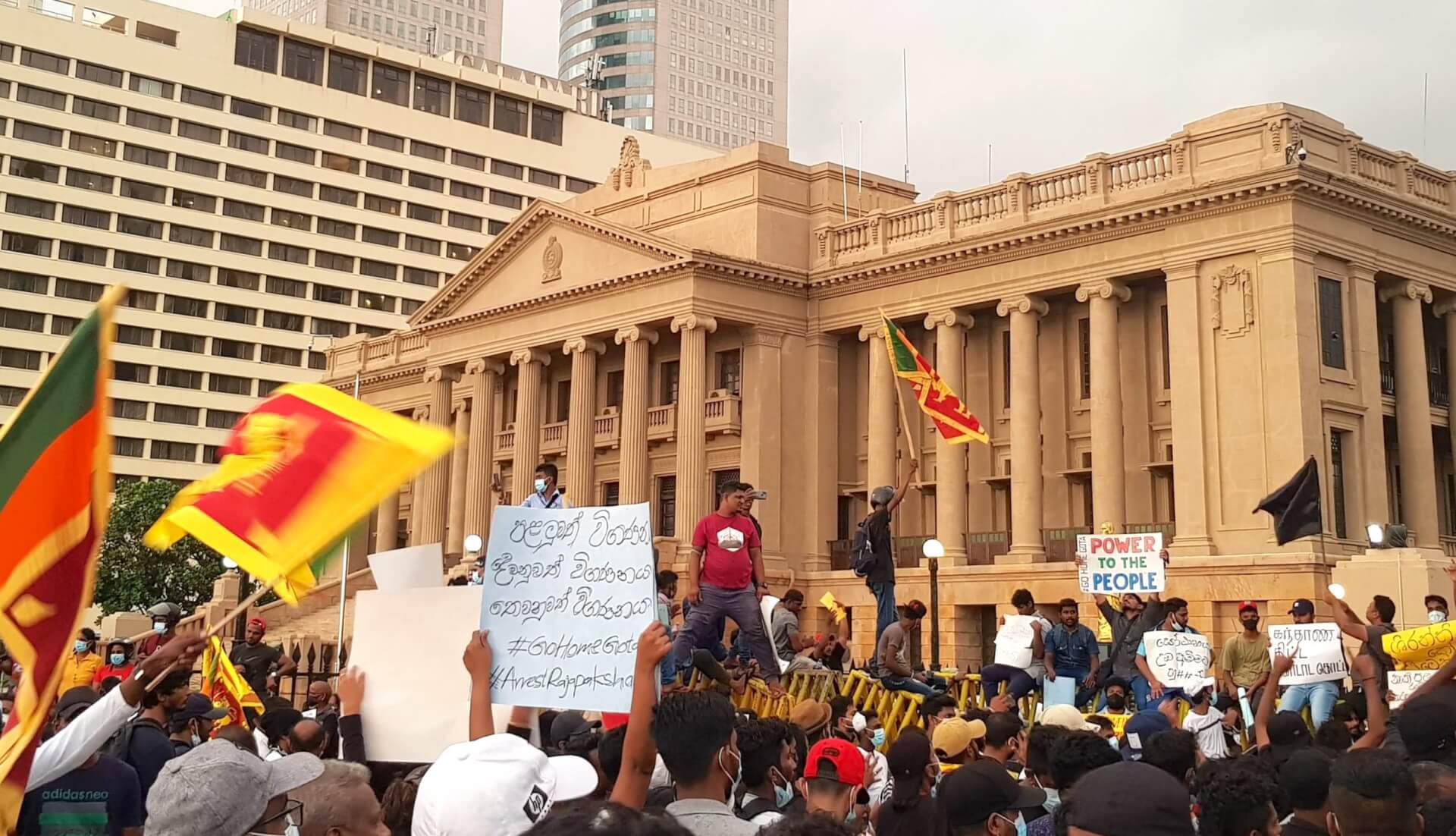The Sri Lankan government has cracked down on demonstrations by arresting several protest leaders who played a hand in forcing now-former President Gotabaya Rajapaksa to resign last month after storming the presidential palace and setting the prime minister’s (PM) residence on fire. Authorities have also imposed travel bans and cleared out protest sites.
The list of those arrested also includes protestors accused of stealing the president’s official flag, beer mug, and chair, when a mob of thousands occupied the presidential palace last month. Three others were arrested for setting PM Ranil Wickremesinghe’s house ablaze,
Among those arrested was Joseph Stalin, a protest leader from the teachers’ union, and Mahanama Thero, a Buddhist monk. While being arrested, Stalin posted a video on social media reiterating that protesting is a democratic right of Sri Lankans. He questioned: “What crime have I committed? Have I stolen public money or murdered people?”
General Secretary of Sri Lanka Teachers’ Union Joseph Stalin arrested over a protest
— NewsWire 🇱🇰 (@NewsWireLK) August 3, 2022
Details: https://t.co/ehYDtk8xyE pic.twitter.com/zRjqEHSdYR
Reports suggest that police officers entered the Galle Face protest site in Colombo on Wednesday and demanded that the area be cleared by Friday, after which they will take down ‘illegal’ structures. The protest site has been occupied by demonstrators since April.
Against this backdrop, the Human Rights Watch (HRW) said that since Wickremesinghe’s induction as president last month, the “police and military have sought to curtail protests through the intimidation, surveillance, and arbitrary arrests of demonstrators, civil society activists, lawyers, and journalists.”
Meenakshi Ganguly, HRW’s South Asia director, said that the arrests were “misguided” and “unlawful” and merely sought to distract from the “urgent economic crisis.”
Sri Lanka: Heightened Crackdown on Dissent https://t.co/yqSK9GaSAz
— Human Rights Watch (@hrw) August 2, 2022
In a similar vein, former Sri Lankan Human Rights Commissioner Ambika Satkunanathan called the arrests a “witch hunt.” She argued, “They are hunting people for minor fractions to crush dissent, while people who are responsible for war crimes, for massive corruption, for bringing the country to its knees are able to just continue business as usual.”
Satkunanathan opined that declaring a state of emergency had become the “default strategy” to curb dissent and media freedom and grant security forces “excessive powers” free from judicial scrutiny.
To this end, over 170 civil society activists and organisations published an open letter condemning the crackdown on peaceful protestors. They rejected the government’s claim that the arrested activists had led and organised the protests, stressing that the demonstrations “do not have leadership.”
President @RW_UNP government must stop arbitrary arrests of non-violent protestors of #GotaGoGama while those who mercilessly attacked them roam free inside @ParliamentLK. This will ruin the chances of success of an all/multi party #SriLanka government. Why not blanket pardon?
— Harsha de Silva (@HarshadeSilvaMP) August 3, 2022
Wickremesinghe, however, has denied reports of a crackdown, saying, “Some groups are trying to spread a huge propaganda through social media that I am hunting down the protesters.”
He claimed that non-violent protests have been “suppressed” by “politicised groups” who have steered demonstrations “towards terrorism.” He declared, “I do not allow violence and terrorism.” The president added that those that participated in illegal acts “unknowingly or due to the influence of others” would be treated “sympathetically.” Nevertheless, he vowed to take “legal action” against those that intentionally violated the law by participating in violent and terrorist activities.
6. There are elements within society who are attempting to disrupt the peace in the country. Peaceful protesters who had legitimate concerns will be engaged with by the Government and solutions will be found for them.
— Ranil Wickremesinghe (@RW_UNP) July 18, 2022
While delivering his policy statement in parliament, the new president said he would allow non-violent demonstrations to continue and declared that he would not “allow any kind of prejudice to the peaceful activists.” Furthermore, he said he would set up an office to protect and support non-violent protestors, urging them to use the 24-hour dedicated line to report any injustice.
Echoing Wickremesinghe’s claims, Minister of Justice Wijeyadasa Rajapakshe said that actions are only being taken against those associated with “criminal activity” and not “peaceful protestors.” He said, “We feel some political groups with a violent past hijacked the protests,” in a veiled reference to the possible influence of the Janatha Vimukthi Peramuna party, which led two armed rebellions in 1970s and 1980s.
Sri Lanka security forces assualt several individuals near Cinnamon Grand hotel including journalists
— NewsWire 🇱🇰 (@NewsWireLK) July 21, 2022
📸 : Xposure News pic.twitter.com/6GY4R1nOxC
Prior to Wickremesinghe taking over as president last month, protesters had been calling for the ouster of former President Gotabaya Rajapaksa and his family for months. Demonstrations took a turn for the worse after Wickremesinghe’s private residence was set ablaze and protesters stormed the presidential palace.
After the protests took a turn for the worse, with then-Prime Minister Ranil Wickremesinghe’s private resident being set ablaze and protestors occupying the Presidential Palace, Rajapaksa stepped down and fled to Singapore. Thereafter, Wickremesinghe was appointed as president in a Parliamentary election.
Rajapaksa subsequently fled the country, appointing Wickremesinghe as acting president; he was officially appointed to the post via a parliamentary vote. However, despite vowing to support peaceful protests, Wickremesinghe has taken a heavy-handed approach and declared a state of emergency almost immediately, vowing to defeat the ‘fascists.’ He also ordered security forces to clear protest sites around the president’s office, injuring at least 50 people.

